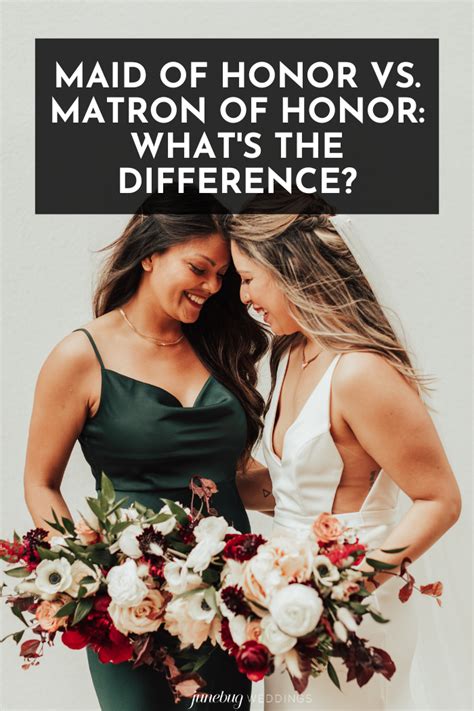In the grand tradition of wedding planning, one of the most significant decisions a bride can make is choosing her right-hand woman. The terms "Matron of Honor" and "Maid of Honor" are often used interchangeably, but they actually refer to two distinct roles. Understanding the differences between these two positions can help you make a more informed decision about who will stand by your side on your special day.

Matron of Honor
A Matron of Honor is a married woman who serves as the chief attendant to the bride. The term "matron" specifically refers to a woman who has been married, making this title a nod to her experience and wisdom. Traditionally, the Matron of Honor is a close friend or family member who has known the bride for many years and has been a source of support and guidance.
Maid of Honor
On the other hand, a Maid of Honor is an unmarried woman who serves as the chief attendant to the bride. This title is often reserved for a younger woman, typically in her early twenties or younger, who is considered a close friend or confidant of the bride. The Maid of Honor is often responsible for organizing the bachelorette party, helping with wedding planning, and providing emotional support to the bride in the lead-up to the wedding.
Key Differences
So, what are the key differences between a Matron of Honor and a Maid of Honor?
- Marital Status: The most significant difference is that a Matron of Honor is a married woman, while a Maid of Honor is unmarried.
- Age: Matrons of Honor tend to be older, often in their thirties or forties, while Maids of Honor are typically younger.
- Responsibilities: Both roles involve supporting the bride and helping with wedding planning, but the specifics may vary. For example, a Matron of Honor might take on more organizational tasks, while a Maid of Honor might focus on planning the bachelorette party.
- Experience: A Matron of Honor may bring more life experience and wisdom to the role, having navigated marriage and relationships herself.
How to Choose
So, how do you decide between a Matron of Honor and a Maid of Honor? Here are some tips to consider:
- Consider Your Relationships: Think about the women in your life who have been closest to you. Are there any married friends or family members who have been a source of support and guidance? Or are there any younger women who have been a confidant and partner in crime?
- Evaluate Your Needs: Consider what kind of support you'll need in the lead-up to the wedding. Do you need help with planning and organization, or do you need someone to provide emotional support and a listening ear?
- Respect Traditions: If you're a traditionalist, you might want to consider the traditional roles and responsibilities associated with each title.
Modern Twists
In modern times, the roles of Matron of Honor and Maid of Honor have evolved to be more flexible and inclusive. Many brides are now choosing to have multiple attendants, including both married and unmarried women. Others are opting for non-traditional titles, such as "Honorary Attendant" or "Bride's Tribe."

Gallery of Wedding Party Roles






Frequently Asked Questions
What is the main difference between a Matron of Honor and a Maid of Honor?
+The main difference is that a Matron of Honor is a married woman, while a Maid of Honor is unmarried.
Can I have multiple attendants with different titles?
+Yes, many brides are now choosing to have multiple attendants with different titles, such as Honorary Attendant or Bride's Tribe.
What are the responsibilities of a Matron of Honor?
+A Matron of Honor typically helps with planning and organization, provides emotional support, and serves as a source of wisdom and guidance.
In conclusion, while the terms "Matron of Honor" and "Maid of Honor" are often used interchangeably, they refer to two distinct roles with different responsibilities and characteristics. By understanding the differences between these two positions, you can make a more informed decision about who will stand by your side on your special day.
